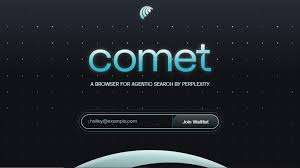In a bold move set to shake up how people find and use information online, Perplexity AI has unveiled Comet, its first AI-powered web browser, as the company ramps up efforts to challenge Google’s dominance in search and browsing.
Comet, launched Wednesday, will initially roll out to users subscribed to Perplexity’s $200-per-month Max plan and select early testers. The new browser aims to integrate Perplexity’s trademark AI-powered search experience directly into how users navigate the web.
Founded in 2022 and based in San Francisco, Perplexity AI has quickly emerged as one of the most intriguing startups in the AI search space.
The company is known for offering concise, AI-generated answers to user queries, contrasting with Google’s approach of listing links. Perplexity’s model is designed to reduce information overload and improve search efficiency, attracting attention from both users and investors.
Perplexity reports rapid growth, handling approximately 780 million queries in May 2025 alone, with month-on-month increases above 20%, according to statements from the company.
Investors see the firm as a potential disruptor capable of redefining how people engage with the internet.
Unlike traditional browsers, Comet embeds Perplexity’s AI engine as its default search tool, offering users real-time summaries of search results instead of simply delivering a list of links.
The browser also includes Comet Assistant, a virtual AI agent designed to help users manage tasks like summarising emails, handling browser tabs, and interacting with web content more efficiently.
Perplexity’s CEO, Aravind Srinivas, has positioned Comet as more than a browser—it’s envisioned as the start of a new “operating system for the web.”
In earlier statements, Srinivas emphasised the goal of creating an environment where users can do nearly everything without leaving the Perplexity ecosystem, potentially achieving what he calls “infinite retention.”
Comet’s debut signals Perplexity’s ambition to carve out a space in the highly competitive browser market, long dominated by Google Chrome and Apple’s Safari. The launch comes as other tech players, including The Browser Company and reportedly OpenAI, are exploring AI-powered browsers that could disrupt traditional search and web navigation.
While Comet’s unique features might appeal to power users and tech enthusiasts, it faces significant hurdles, including persuading users to switch from entrenched browsers and overcoming the high price tag attached to its premium tier.
TALKING POINTS
Let’s not kid ourselves: browsers are no longer neutral windows into the internet. With Comet, Perplexity wants to own the starting point of your digital life.
That’s clever — because whoever controls your browser can nudge how you search, what products you see, and even what truths you believe.
The question is whether users want to swap Google’s monopoly for Perplexity’s AI-driven funnel. It’s not clear that trading one gatekeeper for another is genuine freedom.
But let’s be real: building a browser is a monumentally expensive, cutthroat game with poor track records for newcomers. Netscape, Opera, Brave — the browser graveyard is full of innovations that never dethroned the giants.
Perplexity is betting that fancy AI summaries can crack that wall. But will users pay $200 a month just for that? Doubtful.
African voices are already underrepresented on the web. There’s a danger that AI-powered searches could amplify biases, push Western-centric results, and further marginalise African knowledge and content creators.
Yet there’s a silver lining: African entrepreneurs should seize this moment to build local AI-driven tools tailored to local languages, contexts, and search habits. Why should Perplexity or Google define how Nigerians, Kenyans, or South Africans explore the internet?





